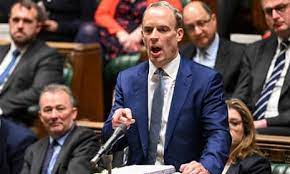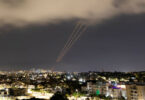Diane Taylor
Deputy prime minister Dominic Raab is not the first senior politician to say that hotels act as a pull factor for asylum seekers and he probably won’t be the last. Doing the media rounds this morning ahead of Wednesday’s government announcement that it plans to use military bases and floating structures as an alternative to hotels to accommodate asylum seekers, Raab said: “One pull factor is people thinking that if they come here illegally they’ll be housed in a hotel. That will end.”
Immigration minister Robert Jenrick told the Sunday Telegraph last November that “Hotel Britain” must end, and a year before that the then home secretary Priti Patel told an evidence session of the Lords justice and home affairs committee that hotels acted as a pull factor for some asylum seekers. Foreign minister James Cleverly recently trotted out the same line on Sky News. It’s not known if any of these ministers have ever asked asylum seekers if their motivation for making dangerous journeys is all about bagging themselves a plush hotel room, nor whether any government research has been done to bolster these assertions. I have interviewed hundreds of asylum seekers since the hotel policy was rolled out in significant numbers at the start of the pandemic, and none has cited the opportunity to stay in a hotel as a factor driving them to the UK. Refugees arrive in the UK for a variety of reasons. But these reasons can be summarised in two words: seeking safety. Hotels don’t appear on any asylum seeker’s wishlist and it’s unlikely that many even know about them. In fact, asylum seekers hate being placed in hotels almost as much as the government hates putting them there. They feel isolated in hotel rooms and long to be able to cook their own food, as those in shared housing known as dispersal accommodation are able to do.
While the government has offered very limited safe and legal routes for those refugees they consider to be “deserving”, they do not engage with the real reasons why asylum seekers who are unable to access these routes continue to arrive here. In its recently announced scheme to streamline asylum decisions for 12,000 asylum seekers from five countries where safe and legal routes are not available or are severely limited, the Home Office has acknowledged that people who have fled from certain countries – Afghanistan, Syria, Eritrea, Libya and Yemen – are overwhelmingly likely to have bona fide refugee protection claims. While it is not (yet) illegal to claim asylum in the UK, the government now routinely refers to asylum seekers as illegal immigrants. This hostile and negative term helps create a collective forgetting of who asylum seekers are and the circumstances they have escaped from.
This government-driven amnesia may assist with short-term political or electoral goals but it obscures the root of the challenge facing the UK and other governments in safe and stable countries. Large numbers of refugees are on the move. While the vast majority of them are not coming to the UK, the issue needs to be tackled internationally rather than unilaterally. Soundbites like “Stop the boats” or “End hotel use” won’t fix things. Asylum seekers are not embarking on treacherous journeys and squeezing into overcrowded dinghies in northern France so they can bed down at the Ritz. In fact the reality of the hotels they are placed in is more likely to be rodents, mould and food so poor that children lose weight. But, for asylum seekers, safety trumps living conditions, however grim they might be, every time. If the government does not engage with the truth about who asylum seekers are and what propels them towards the UK they will never solve this issue. The plan to end hotel use is likely to be welcomed as much by asylum seekers as by the voters the government hopes will applaud Wednesday’s announcement. But changing accommodation from hotels to military bases, ships or barges won’t stop people faced with life or death decisions from arriving here.







